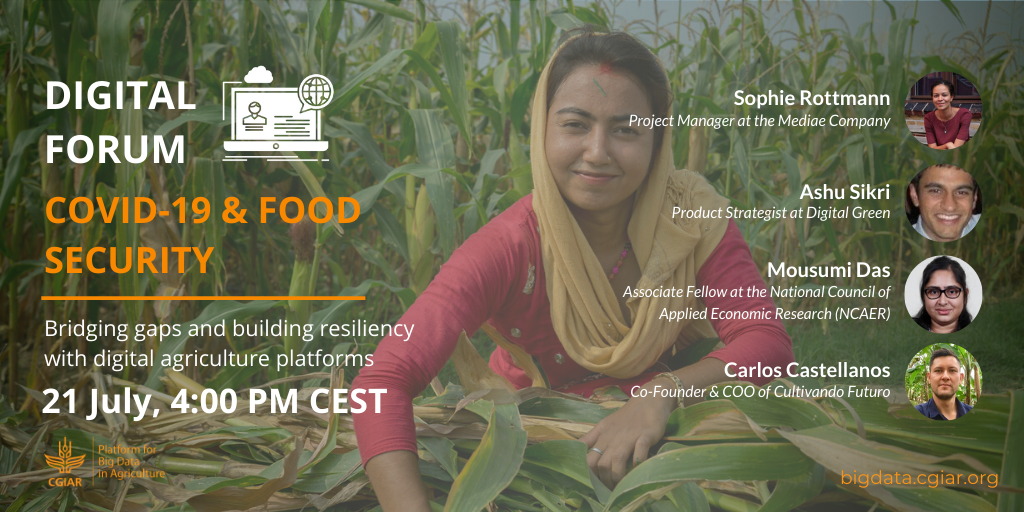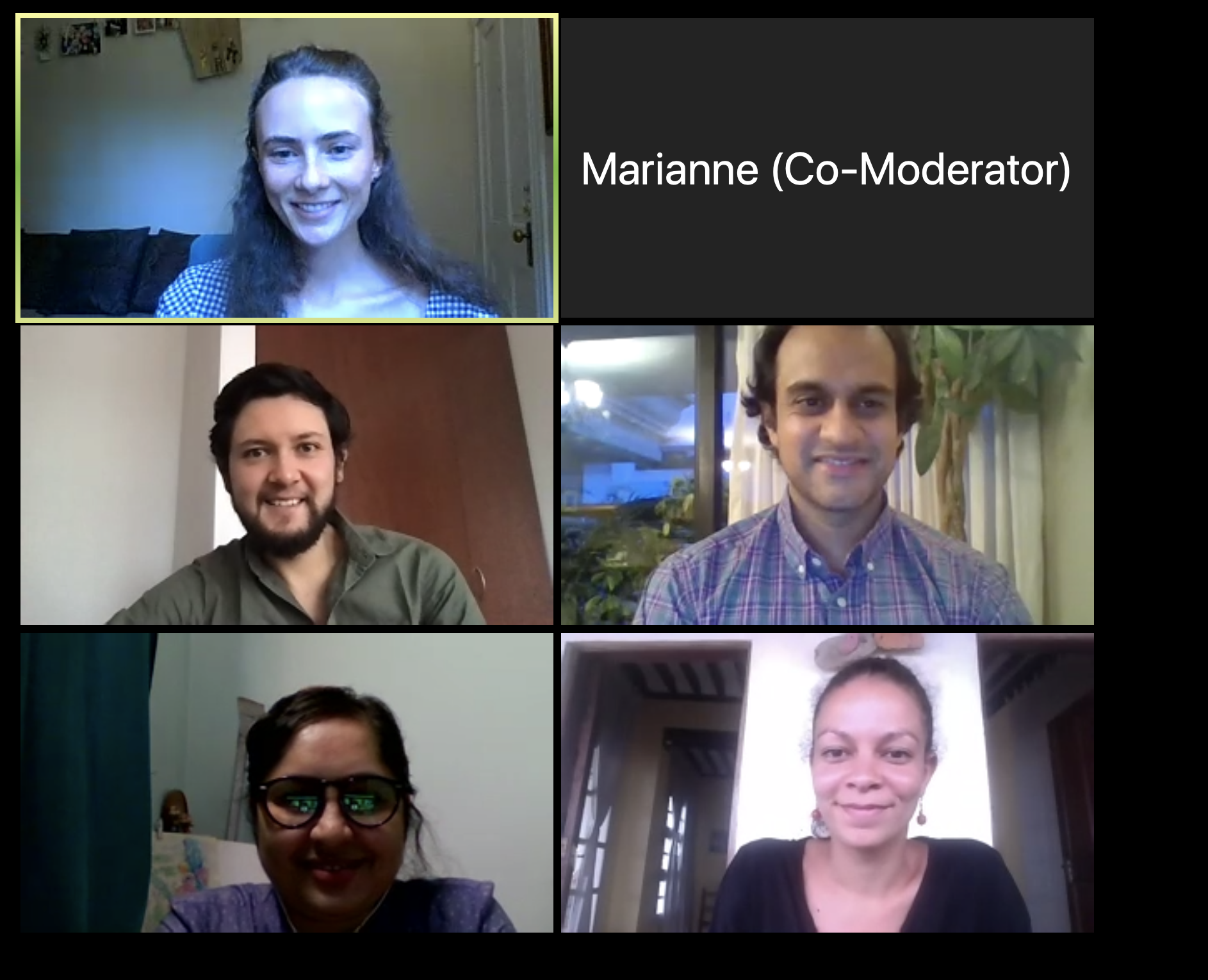WEBINAR SUMMARY – Big data & COVID-19: Bridging gaps & building resiliency with digital agriculture platforms (Eps. 4)
The fourth episode of our Discussion Series: Big data solutions to COVID-19 & food security, brought together four panelists to discuss bridging gaps and building resiliency with digital agriculture platforms.
From using satellite remote sensing to monitor crop harvests to leveraging social media data to track population dynamics that may influence the spread of disease, big data tools and approaches have been instrumental in sensing and responding to the pandemic’s impacts on global food security and supply chains.
As we begin recovering and (re)building resilient food systems, we must leverage the power of big data to examine concepts of resilience and inform our understanding of how digital dynamism enables adaptive food systems in the face of shocks, and, in the longer term, addresses systemic issues in agriculture that have been exacerbated by the COVID-19 crisis.
The fourth panel, held 21 July, brought together four panelists to discuss bridging gaps & building resiliency with digital agriculture platforms.
WATCH THE RECORDING HERE
Here are the main take-aways from each of the speakers:
Sophie Rottmann
Project Manager, Mediae Company
Sophie Rottman is a Project Manager at Mediae, a social enterprise that addresses the information needs of East Africans through sustainable and research-based media productions. She currently oversees the production of Shamba Shape Up, East Africa’s largest farm make-over show on smallholder farms. She is committed to bridging the gap between research on (climate smart) agriculture and farmers, who could benefit from these findings if communicated with in a simple and accessible way.
Key takeaways from Sophie Rottmann
- Shamba Shape Up looks at using media for education and development. The organization created a 26-episode series on various agricultural practices to help farmers improve their crops. Research from Wageningen University on 13,000 farmers has shown that their maize and milk production increased in value as a direct result of watching the programme.
- Digital tools allow farmers access to information
- A survey on 1,000 farmers showed that over 60% of people accessed COVID-related information via TV and radio, less than 20% via local governments, less than 10% from neighbors, showing that people lack access channels;
- In Nairobi, one of the biggest impacts of the lockdown was farmers’ inability to sell their produce, along with less access to inputs, and less time for farm activities;
- Digital technology needs to also address supporting farmers who face aggregate risks – i.e. extreme events, pests, etc.
- iShamba and CIAT will extend the survey on COVID impacts on farmers to 3,000 farmers and will take one year to follow up with farmers and see the effects of interventions;
- Shamba Shape will increasingly focus on CSA, potentially including a weekly weather forecast, on seeds and access to inputs, crop insurance, seed resilience, conservation agriculture, supporting farmers to feed livestock during droughts, on water and soil management, etc;
Ashu Sikri
Product Strategist, Digital Green
Ashu Sikri is a Product Strategist at Digital Green, a global NGO that uses technology & partnerships to support smallholders increase their incomes. DG focuses on using participatory videos shared via multiple digital channels to strengthen public extension services. Ashu previously led Strategy at Crux Informatics, a fintech startup that manages data delivery and operations for financial services companies. He was also an early stage impact investor with Omidyar Network, a philanthropic investment firm, and started his career at Audax Group, a Boston based private equity firm. Ashu studied Economics and Finance at the Wharton School at the University of Pennsylvania and is based in Mumbai.
Key takeaways from Ashu Sikri
- Digital Green believes strongly in the power of technology to empower farmers to get out of poverty; the NGO reached over 2 million farmers, having significant impacts in increasing adoption of extension services and yield increase;
- To mitigate supply chain disruptions, the NGO launched an Uber-like pool system for farmers to send their products to markets
- Post-pandemic, the NGO aims to connect farmers directly to consumers, providing more transparency on the origin of produce, and giving farmers more decision powers and sustainable communication channels;
- Farmers use Whatsapp to list their products, providing a catalogue to consumers – this is a paradigm change that cuts out middlemen and allows farmers to manage easier workflows in a more intuitive way;
- COVID has accelerated the shift to providing tailored, more contextually relevant information to farmers, according to what they are growing;
- One of the aims of the NGO is to maintain clusters of consumers and producers in small geographic areas, promoting hyperlocal, low-carbon economies and resilient crops;
- By enabling farmers to communicate what they are doing, the project allows them to provide a guarantee for the quality of their produce, instead of a formal standard for organic agriculture, which might not be easy to achieve.
Mousumi Das
Associate Fellow, National Council of Applied Economic Research (NCAER)
Mousumi Das is an Associate Fellow at the National Council of Applied Economic Research. Mousumi is a micro-econometrician and her research interests are in poverty measurement, nutrition and health, gender, migration, and education. Mousumi was earlier an Assistant Professor in the Economics Department at Xavier University, Bhubaneswar, and, prior to that, an Assistant Professor at IFMR- KREA University in Chennai. She has been a consultant with the World Bank where she worked with the South Asia Regional Gender Innovation Lab.
Key takeaways from Mousumi Das
- Calcutta, India has been exposed to aggregate risks – the COVID-19 pandemic, intense cyclones and locust invasions, while the Sundarbans have been affected by intensified extreme weather;
- Exposed fault lines but also made households vulnerable to aggregate shocks;
- Severe impacts on household purchasing power, food acquisition, disrupted supply chains, loss of food variety and availability, absorption capacity, contamination of food items, declining health status, overall decline in food security;
- Rising price of vegetables, fish, poultry;
- Women were hard hit, along with youth, migrant workers, and their families;
- Digital solutions need to close gaps in providing information, running surveys, in safeguarding social protection strategies for the urban poor.
Carlos Castellanos
Co-Founder and COO, Cultivando Futuro
Carlos Castellanos is the Co-Founder & COO of Cultivando Futuro,an agribusiness platform based in Colombia to link up producers, organisations and buyers, enabling them to make better decisions based on key information. Carlos applies technology to create a positive social and sustainable impact within rural
Communities. He’s an advocate for farmers inclusion. He has been speaker in the Committee on World Food security CFS2019 at FAO (United Nations) and as COO of Cultivando Futuro he uses his expertise in agriculture knowledge and cooperation with rural communities to provide consultancy to and create alliances between organizations.
Key takeaways from Carlos Castellanos
- More than 60% of farmers working with Cultivando Futuro are using Whatsapp or other apps for communicating, with almost 94% of them having access to a phone;
- It is important to have in mind farmers’ needs when it comes to trading – e.g. many of them don’t have their own vehicles, or are throwing away their produce because they can’t access markets
- Cultivando Futuro has created a calendar in conjunction with the ministry of agriculture to provide information on crop availability, location, yield increase, farmer data, etc;
- They also developed a chat-based app without limits for group participants, as well as tools that allow farmers to publish their produce more easily;
- Actors in agriculture didn’t use to have a channel they could use to communicate between them – they missed data or information for better decision making;
- Cultivando Futuro created an information platform, integrating socio-economic, infrastructure and crop information; the platform connects farmers with organizations focused on rural development or with service providers; the platform can collect, analyse, and deliver data insights to help farmers make better decisions and participate in inclusion programmes. The app doesn’t require an internet connection 24/7.
July 21, 2020
The BIG DATA Team
CGIAR Platform for Big Data in Agriculture
Cali Colombia
Latest news





 Mousumi Das
Mousumi Das



